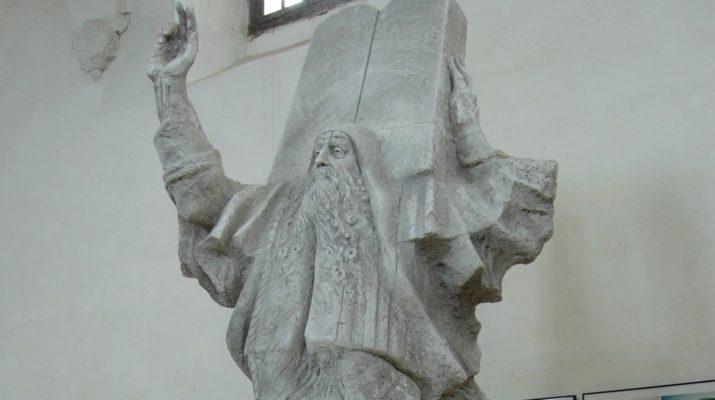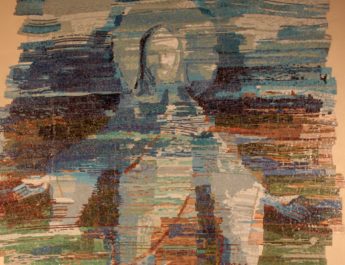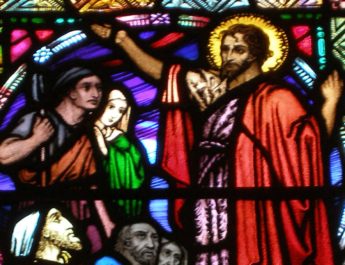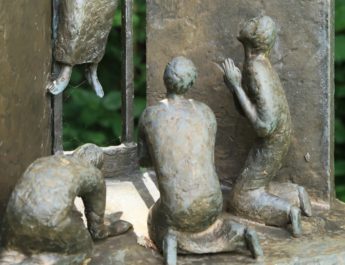Deuteronomy 5:11-22
A Women’s Lectionary – Third Sunday of Easter
BibleHub
11 You shall not make wrongfulA useB of the nameC of the LordD your God,E for the Lord will not acquitF anyone who misusesG his name.
Notes on verse 11
A “wrongful” = shav. Perhaps from the same as sho (ruin, desolation, storm; from a root that means rushing over – hence a storm and hence devastation). This is emptiness, false, worthless, deceit. It can also refer to evil, guile, idolatry, or something being in vain.
B “make…use” = nasa. This is to lift in a broad sense, literally and figuratively. So it could be to carry, take, or arise. It could also be bring forth, advance, accept.
C “name” = shem. May be from sum (to put, place, set). This is name, fame, renown. A name was thought to indicate something essential about a person – something about their individuality. So, this word can also mean honor, authority, or character.
D “Lord” = YHVH. From havah (to be, become) or hayah (to come to pass, become, be). This is the name of the God of Israel, the self-existent and eternal one, the tetragrammaton. This pronunciation has been lost to time so “Lord” is generally used in its place.
E “God” = Elohim.
F “acquit” = naqah. This is to be empty, cleanse, acquit, blameless, immune, innocent. It is to be clean or to make clean in a literal or figurative sense. It can also be bare in a negative sense, destroyed.
G “misuses” = nasa…shav. Same as “make wrongful use” in v11. See notes A & B above.
12 ObserveH the sabbathI dayJ and keep it holy,K as the Lord your God commandedL you.
Notes on verse 12
H “observe” = shamar. This is to keep, watch, or preserve. It means to guard something or to protect it as a thorny hedge protects something.
I “sabbath” = shabbat. From shabath (to rest, stop, repose, cease working; by implication, to celebrate). This is sabbath, literally meaning rest or intermission.
J “day” = yom. Root may mean being hot. This is the day in a literal or figurative sense. It can also mean birth, age, daylight, continually or other references to time.
K “keep…holy” = qadash. From qodesh (set apart and so sacred; God is different from us and so God is holy/set apart; things we dedicate to God’s service are set apart for God and so they, too, are holy). This is set apart, consecrated, hallowed, sanctified. This is something or someone that is set apart for a holy purpose or use – ceremonially or morally clean.
L “commanded” = tsavah. This is to charge, command, order, appoint, or enjoin. This is the root that the Hebrew word for “commandment” comes from (mitsvah).
13 SixM days you shall laborN and doO allP your work.Q
Notes on verse 13
M “six” = shesh. This is six. Figuratively, it can be a surplus since it is one more than the number of fingers on the hand.
N “labor” = abad. This is to work, serve, or compel. It can describe any kind of work or service (including religious devotion). Also, till or cultivate. Used causatively, it can mean to enslave or keep in bondage.
O “do” = asah. This is to make, do, act, appoint, become in many senses.
P “all” = kol. From kalal (to complete). This is all or every.
Q “work” = melakah. From the same as malak (messenger, an angel, or a deputy; human messengers literally or for prophets, priests, or teachers as messengers of God; also supernatural messengers i.e. angels). Properly, this is a deputyship or some kind of work. It can also be the product that comes from labor.
14 But the seventhR day is a sabbath to the Lord your God; you shall not do anyS work—you, or your sonT or your daughter,U or your maleV or female slave,W
Notes on verse 14a
R “seventh” = shebii. From sheba (seven – the number of perfection/sacred fullness). This is seventh.
S “any” = kol. Same as “all” in v13. See note P above.
T “son” = ben. From banah (to build or obtain children). This is son, age, child. It is son in a literal or figurative sense.
U “daughter” = bat. Related to “son” in v14. From ben (see note S above). This is daughter in a literal or figurative sense.
V “male” = ebed. Related to “labor” in v13. From abad (see note N above). This is a servant, slave, or bondservant.
W “female slave” = amah. This is female servant or slave, handmaid.
or your oxX or your donkey,Y or any of your livestock,Z or the resident alienAA in your towns,BB so that your male and female slave may restCC as well as you.
Notes on verse 14b
X “ox” = shor. Perhaps from shur (to travel, turn, journey; travelling like a prostitute or a merchant). This is bull, ox, head of cattle, cow.
Y “donkey” = chamor. From chamar (to be red, blush). This is a male donkey.
Z “livestock” = behemah. This is animal or cattle. It is often used of large quadrupeds.
AA “resident alien” = ger. From gur (to abide or sojourn; to leave the road to lodge or for any other reason). This is sojourner, guest, stranger, foreigner.
BB “towns” = shaar. May be related to sha’ar (to calculate or reckon; may come from a root that means to open up or split). This is a gate, door, or other opening like a port.
CC “rest” = nuach. This is to rest, calm, camp, free, place, remain, satisfy, settle, station, or wait. It is rest and so implies settling down in a literal or figurative sense. This is perhaps the root verb of the name “Noah.”
15 RememberDD that you were a slaveEE in the landFF of Egypt,GG and the Lord your God broughtHH you out
Notes on verse 15a
DD “remember” = zakar. This is to remember, to mark something so that it can be recalled, to be mindful of, to mention.
EE “slave” = ebed. Same as “male” in v14. See note U above.
FF “land” = erets. Root may mean to be firm. This is earth, ground, field land, or country.
GG “Egypt” = Mitsrayim. Perhaps from matsor (besieged or fortified place, bulwark, entrenchment; something hemmed in; a siege or distress or fastness); from tsur (to confine, besiege, to cramp). This is Egypt.
HH “brought” = yatsa. This is to go or come out, bring forth, appear. It is to go out in a literal or figurative sense.
from there with a mightyII handJJ and an outstretchedKK arm;LL thereforeMM the Lord your God commanded you to keepNN the sabbath day.
Notes on verse 15b
II “mighty” = chazaq. From chazaq (to strengthen, seize, be courageous, repair, bind, heal, conquer, harden). This is strong, hard, powerful, loud, bold, violent, impudent. It is usually strong in a negative sense.
JJ “hand” = yad. This is hand, ability, power. Hand in a literal sense, but also what one can do or the means by which one does it.
KK “outstretched” = natah. This is to stretch or spread out, to extend, or bend. In can also imply moral deflection.
LL “arm” = zeroa. Perhaps from zara (to sow, scatter seed, conceive). This is the arm, shoulder, or foreleg of an animal. It is figuratively used for power, force, might, or help.
MM “therefore” = ken. Perhaps from kun (properly, in a perpendicular position; literally, to establish, fix, fasten, prepare; figuratively, it is certainty, to be firm, faithfulness, render sure or prosperous). This is to set upright. Generally used figuratively to mean thus, so, afterwards, rightly so.
NN “keep” = asah. Same as “do” in v13. See note O above.
16 HonorOO your fatherPP and your mother,QQ as the Lord your God commanded you, so that your days may be longRR and that it may go wellSS with you in the landTT that the Lord your God is givingUU you.
Notes on verse 16
OO “honor” = kabad. To be heavy, weighty, or severe. It can also be positive abounding in, rich, or honorable. The Hebrew word for “glory,” kabod, is taken from this root.
PP “father” = ab. This is father, chief, or ancestor. It is father in a literal or figurative sense.
QQ “mother” = em. This is a mother as binding a family together or a breeding female animal. It could be mother in a literal or figurative sense.
RR “be long” = arak. This is to continue, lengthen prolong, delay, or endure. It is being long or causing something to be long in a literal or figurative sense.
SS “go well” = yatab. This is to be good or pleasing, joyful. It can also mean doing good in an ethical sense or be beautiful, happy, successful, or right.
TT “land” = adamah. From the same as adam (man, humankind); perhaps from ‘adom (to be red). This is ground, earth, soil as red, or land.
UU “giving” = natan. This is to give, put, set, offer. It is to give literally or figuratively.
17 You shall not murder.VV
18 Neither shall you commit adultery.WW
19 Neither shall you steal.XX
Notes on verses 17-19
VV “murder” = ratsach. Properly, this is to dash something to pieces. It is to kill a person, but it is used particularly (though not exclusively) for murder.
WW “commit adultery” = naaph. This is to commit adultery or, figuratively, to be an apostate.
XX “steal” = ganab. This is to steal in a stealthy way rather than through violence. It can also mean to deceive. There is a Yiddish word ganef that derives from this root. It means thief or scoundrel.
20 Neither shall you bearYY falseZZ witnessAAA against your neighbor.BBB
Notes on verse 20
YY “bear” = anah. This is answer, respond, announce, sing, shout, or testify. It means to pay attention, which implies responding and, by extension, starting to talk. Used in a specific sense for singing, shouting, testifying, etc.
ZZ “false” = shav. Same as “wrongful” in v11. See note A above.
AAA “witness” = ed. From ud (to admonish, repeat, duplicate, testify, restore, record, relieve). This is a witness, testimony, or one who records testimony. It can also refer to a prince.
BBB “neighbor” = rea. From raah (to associate with). This is the same as neighbor in Leviticus 19:18 “love your neighbor as yourself.” This is friend, companion, fellow, neighbor. It is someone with whom you associate, whether more or less close.
21 Neither shall you covetCCC your neighbor’s wife.DDD Neither shall you desireEEE your neighbor’s house,FFF or field,GGG or male or female slave, or ox, or donkey, or anythingHHH that belongs to your neighbor.
Notes on verse 21
CCC “covet” = chamad. This is to desire or delight in someone or something. It can also mean something that is precious or coveted. So, it can also refer to lust.
DDD “wife” = ishshah. From ish (man); perhaps from enosh (human, humankind, mortal); from anash (to be weak, sick, or frail). This is woman, wife, or female.
EEE “desire” = avah. This is to desire, wish for, crave, lust after, to incline.
FFF “house” = bayit. Related to “son” and “daughter” in v14. Probably from banah (see note S above). This is house, court, family, palace, temple.
GGG “field” = sadeh. This is literally field, ground, soil, or land. It can be used to mean wild like a wild animal.
HHH “anything” = kol. Same as “all” in v13. See note P above.
22 These wordsIII the Lord spokeJJJ with a loudKKK voiceLLL to your wholeMMM assemblyNNN at the mountain,OOO
Notes on verse 22a
III “words” = dabar. From dabar (to speak, declare, discuss). This is speech, a word, a matter, an affair, charge, command, message, promise, purpose, report, request. It is a word, which implies things that are spoken of in a wide sense.
JJJ “spoke” = dabar. Related to “words” in v2. See note III above.
KKK “loud” = gadol. From gadal (to grow up, become great, become wealthy – to advance. The root meaning may be to twist in the sense of the process of growing). This is great, high, bigger, noble, old, marvelous. It can also refer to someone who is powerful or distinguished.
LLL “voice” = qol. This is a sound, used often for human voices. Also used when God speaks or angels, animals or instruments. It can be a cry or a noise, thunder or earthquakes and so on.
MMM “whole” = kol. Same as “all” in v13. See note P above.
NNN “assembly” = qahal. This is an assembly, congregation, or multitude.
OOO “mountain” = har. From harar (hill or mountain). This is mountain, hill, hilly region.
out ofPPP the fire,QQQ the cloud,RRR and the thick darkness,SSS and he added no more.TTT
Notes on verse 22b
PPP “out of” = tavek. This is among, middle, in the midst, the center. Perhaps, properly, to sever.
QQQ “fire” = esh. This is fire, burning, flaming, hot. It is fire in a literal or figurative sense.
RRR “cloud” = anan. May be from anan (cover, cloud over; figuratively, acting in a secret way, practicing magic or soothsaying). This is a cloud as something that covers the sky.
SSS “thick darkness” = araphel. 15x in NT. From araph (to droop, drip, drop). This is a cloud or deep darkness. It is gloom or gloomy as the sky being lowered.
TTT “added…more” = yasaph. This is to add, increase, continue, exceed.
He wroteUUU them on twoVVV stoneWWW tablets,XXX and gave them to me.
Notes on verse 22c
UUU “wrote” = katab. This is to inscribe, write, record, or decree.
VVV “two” = shenayim. From sheni (double, again, another, second); from shanah (to fold, repeat, double, alter, or disguise). This is two, both, second, couple.
WWW “stone” = eben. This is a stone, weight, or mason. It is part of the word “Ebenezer.”
XXX “tablets” = luach. Root likely means glistening, so this would refer to a tablet as being polished in some sense, whether it’s made of stone, wood, or metal.
Image credit: “The sculpture of Moses in the synagogue in Szydłów, Poland” – Photo by Jakub Hałun, 2006.




